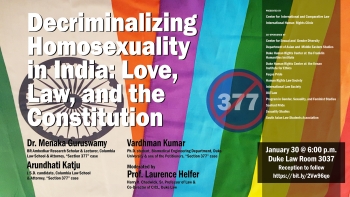Decriminalizing Homosexuality in India: Love, Law, and the Constitution
 Human Rights in Practice -- Decriminalizing Homosexuality in India: Love, Law, and the Constitution; Jan. 30, 2019, 6 p.m., Duke Law School Room 3037
Human Rights in Practice -- Decriminalizing Homosexuality in India: Love, Law, and the Constitution; Jan. 30, 2019, 6 p.m., Duke Law School Room 3037
Wednesday, January 30, 2019
6:00 p.m. | Duke Law Room 3043
In a landmark decision on September 6, 2018, the Supreme Court of India ruled unanimously that Section 377 of the Indian Penal Code was unconstitutional “in so far as it criminalises consensual conduct between adults of the same sex.” Join Vardhman Kumar, one of the petitioners, and Menaka Guruswamy and Arundhati Katju, attorneys for the petitioners, in a panel discussion about the decision and LGBTI rights in India. The conversation will be moderated by Professor Laurence Helfer, Harry R. Chadwick, Sr. Professor of Law and Co-Director of the Center for International and Comparative Law (CICL). Reception to follow.
This event is part of the Duke Law Human Rights in Practice series organized by CICL and the International Human Rights Clinic. Co-sponsored by: Center for Sexual and Gender Diversity; Department of Asian and Middle Eastern Studies; Duke Human Rights Center at the Franklin Humanities Institute; Duke Human Rights Center at the Kenan Institute for Ethics; Fuqua Pride; Human Rights Law Society; International Law Society; OUTLaw; Program in Gender, Sexuality, and Feminist Studies; Sanford Pride; Sexuality Studies; and South Asian Law Students Association. Contact Balfour Smith (bsmith@law.duke.edu) for additional information.
Biographies
Menaka Guruswamy
Dr. Menaka Guruswamy is BR Ambedkar Research Scholar and Lecturer at Columbia Law School. She also practices law before the Supreme Court of India. Dr. Guruswamy has practiced law in New York, as an associate at Davis Polk & Wardwell. She has advised the United Nations Development Fund, New York and United Nations Children’s Fund (UNICEF), New York and UNICEF South Sudan on various aspects of International Human Rights Law and has also supported the constitution-making process in Nepal. In her litigation practice in India, she focusses on large constitutional rights claims, and has successfully brought reform of the bureaucracy in the country, defended federal legislation that mandates that all private schools admit disadvantaged children, and challenged colonial-era laws that criminalise consensual same-sex relations. Dr. Guruswamy read law as a Rhodes Scholar at Oxford University (Doctor of Philosophy in Law (D. Phil.)) and as a Gammon fellow at Harvard Law School (LL.M.). » Read more
Arundhati Katju
Arundhati Katju, a J.S.D. candidate at Columbia Law School, is an Indian lawyer with over thirteen years’ experience in Indian trial and appellate courts. Her work encompasses a broad array of practice areas, including white collar defense, legal aid, and LGBT rights litigation. She headed her own law offices and also acted as barrister for leading Indian law firms, representing clients in India, Germany, Singapore, and the United States. In addition, Ms. Katju served as a public defender with the Delhi High Court Legal Services Committee. She holds a B.A. LL.B. (Hons.) degree from the National Law School of India University and an LL.M. from Columbia Law School, where she was a Human Rights Fellow, James Kent Scholar, and Public Interest Honoree. » Read more
Vardhman Kumar
Vardhman Kumar is a second year PhD student in the department of Biomedical Engineering at Duke University. His doctoral work involves understanding the biophysics underlying organ development and disease progression through designing and building ‘organ(s)-on-chip’ – devices that recapitulate the architecture and functionality of human organs on miniature microfluidic chips. He graduated with a bachelor’s and a master’s degree with Honors in Chemical Engineering along with a minor in Environmental Engineering from the Indian Institute of Technology Bombay (IIT Bombay), India’s top engineering and higher education institution.
During his undergraduate years, he was actively involved with Saathi – the LGBTQ support group of IIT Bombay and the first such group at an educational institute in India. The group aims at increasing visibility and awareness about LGBTQ issues in the campus while providing a safe space for members to connect. He has also worked for Queer Azaadi Mumbai Pride March – Mumbai’s annual pride parade, helping bring several of the pride events into the IIT Bombay campus. As a member of Pravritti, a pan-IIT group of around 400 members, he was one of the co-petitioner in the petition filed by a batch of 20 current and former students of IITs seeking scrapping of Section 377.
At home, he is supported by his very loving family members who continue to show immense courage and strength in accepting his identity and decisions.